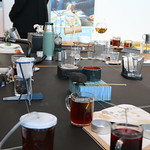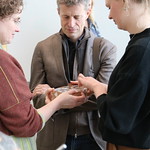This elective invites students to consider and deepen (both hands-on and through reflection) their understanding of the relationship between aesthetics and various concepts from human sciences that are at stake in the design process for transformation, including philosophy, psychology, sociology and economics. For this aim, three frameworks are introduced and discussed (examples):
- complex thinking,
- learning,
- lenses & perspectives,
- embodied theories,
- post-phenomenology,
- transition theories.
Throughout the elective, students analyse the implication of these frameworks on the designs they create (as aesthetics propositions), and of designs on these frameworks. To reflect on their practice based on the three frameworks, students visualise all noticeable shifts in their designs, in their processes and in relations between and within these frameworks.
This reflection will be supported by a frequential redesign of an everyday design, seen as an embodied experience of an aesthetical and ethical proposition.
Learning objectives
- Identify, structure and illustrate relations between design (as aesthetical propositions) and other disciplinary fields within human and social sciences,
- Reflect on the impact of design on society and on oneself.













